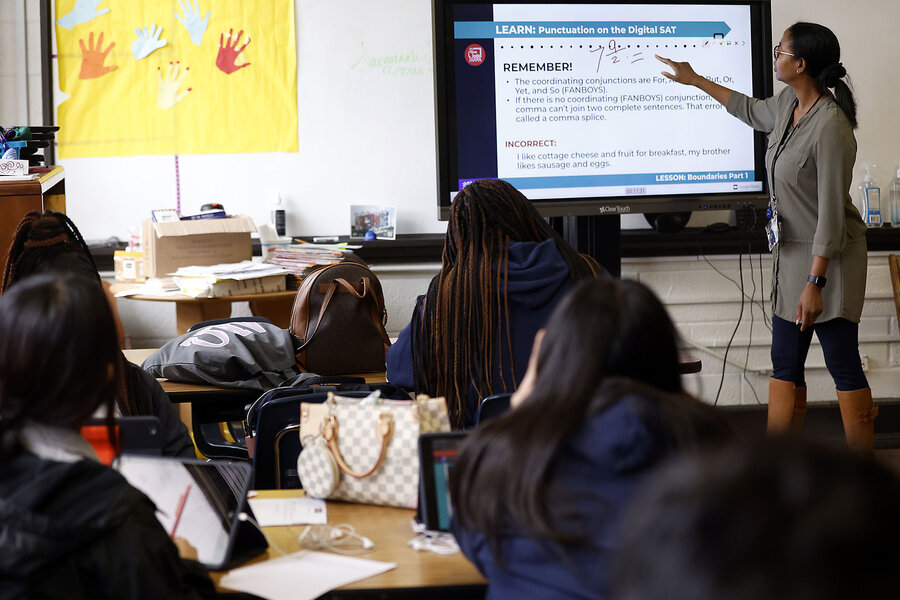Why some top colleges are requiring the SAT again
Loading...
Pandemic-era response to disruptions in college admissions is coming to an end at some of the most highly selective colleges in the United States. Standardized testing largely became optional for admittance for first-year students in fall 2021. It remains that way at a majority of institutions issuing four-year degrees. Earlier this month, Brown University in Providence, Rhode Island, became the latest to reinstate a testing requirement. And soon it will no longer be optional at schools such as Yale, Dartmouth, Georgetown, and the Massachusetts Institute of Technology. Some think it’s a sign of what’s to come.
In late February, Yale University announced that, to be admitted starting in fall 2025, students will have to submit some form of standardized test results. They can choose from traditional SAT or ACT scores, or subject-based scores from Advanced Placement or International Baccalaureate tests. The university says this decision came after a few years of test-optional admissions had been shown to hurt low-income students who withheld test scores.
Also in February, Dartmouth College announced a return to standardized-test admissions requirements after school President Sian Beilock ordered an internal study. Dartmouth found that rejected low-income students who omitted SAT scores but scored in the 1400s would otherwise have been admitted. The school would have taken those scores into account had the students reported them.
Why We Wrote This
Yale, Brown, and Dartmouth are among the highly selective colleges reinstating a testing requirement, saying it will help low-income students. Most other universities are keeping the tests optional, citing the same reason. Who’s right?
Q: Why has Yale, for example, taken another look at testing?
Jeremiah Quinlan, dean of undergraduate admissions at Yale, says that application reviewers and researchers had placed greater weight on other parts of the application for people who applied without submitting test scores. But reviewers noticed it worked to the disadvantage of some applicants.
“We found that applicants without scores from lower socioeconomic backgrounds were less likely to be admitted than others, because they were less likely to have that evidence in other parts of their applications,” says Mr. Quinlan via email.
Yale said that it has admitted more than 1,000 applicants who did not submit test scores and that those students have performed relatively well in their coursework. Where it noticed a difference was in grade-point averages, with students who submitted test scores getting better grades than those who did not.
Q: What happened when schools went test-optional?
Highly selective schools at one point experienced a backlash for being sticklers in requiring standardized test scores, as critics noted that those tests favored wealthy students who could afford test preparation classes and tutors to improve their results. Complaints also arose that the tests were culturally biased against students of color and those who didn’t speak English as a first language. In 2020, Cornell became the first in the Ivy League to go test-optional. That same year, amid the pandemic, some 650 schools in America did likewise.
A 2021 study of 99 colleges that went test-optional between the 2005-2006 academic year and 2015-2016 found that this resulted in a 3% to 4% gain in low-income Pell Grant recipients and a 10% to 12% gain in Black, Latino, and Native American students. But the study’s author said there were so few of those students on campuses that the effective change in campus makeup was more like a 1% gain in Pell Grant recipients and a 1% gain in Black, Latino, and Indigenous students.
Individual schools, such as the University of Chicago – which went test-optional in 2018 – cited broader gains. It saw 20% more first-generation and low-income students the year after it dropped the testing requirement, and rural student admissions spiked 56%. It also saw record classes of Black and Latino students. But dropping the testing requirement came amid a slate of policies designed to diversify enrollment, and the university said the increases could not be attributed solely to dropping the SAT and ACT.
In a statement, the College Board, which administers the SAT, said schools requiring the test have done so because research shows that SAT scores are more predictive of college success than are high school grades alone. “A growing body of research confirms that the SAT is a valuable, objective measure useful not just in admissions but in creating data-driven programs to ensure admitted students get the supports they need to graduate,” the organization wrote.
Q: If not tests, then what?
Erik Loomis is an associate professor of history and the director of graduate studies at the University of Rhode Island, and has written about why standardized testing should return as a metric for admissions. He thinks schools should reinstate standardized testing for equity reasons.
“It’s a sad state of affairs because everybody who says that standardized tests reflect racial inequality, I think are actually correct. The problem is that everything that replaces that seems to be even worse,” Dr. Loomis says.
One main culprit is the college essay, he adds. Just as well-resourced families have a leg up for SAT or ACT prep, people can also pay others to teach students to write an effective essay. Those less scrupulous sometimes pay others to write college essays, or experienced adults simply write them for their children.
“And the people who are just trying to tell their stories, but maybe are coming from a situation in which they are totally brilliant, but they live in Central Falls, Rhode Island, which is an incredibly poor, mostly Colombian and African American town – maybe the grammar is not as good, it’s not as sharp and polished, but that person might be incredibly brilliant,” Dr. Loomis notes.
Dr. Loomis says that college admissions committees have realized that people game the system and that a return to tests might be a little less problematic. He also guesses that highly selective schools are trying to head off potential lawsuits from students not being admitted while others are under test-optional policies.
Q: What about public universities?
While some highly selective schools have reinstituted test requirements, the University of Michigan, a premier public university, announced in February that it was moving to a permanent test-optional policy for 2025. This came after Michigan went test-flexible in 2020, accepting SAT, ACT, PSAT, IB, or AP scores. Now only SAT and ACT scores will be accepted if students choose to submit them. Michigan says this is to provide access to high-achieving students from all backgrounds. Other highly selective schools such as Harvard, Columbia, and the University of Chicago also remain test-optional.
The University of California, including its premier Berkeley and Los Angeles campuses, also has test-free admissions.
In that regard, Brown, Dartmouth, and Yale look like outliers. “It’s definitely not a harbinger,” says Bob Schaeffer, director of public education for the National Center for Fair & Open Testing. “There are nearly 2,300 four-year colleges in the U.S., and the fact that a handful have reverted to requiring testing when more than 1,700 are permanently test-optional or test-blind is a minor development.”
He says that although a small number of schools have concluded that test scores have some value in the admissions process, in the end the proof will be in the numbers. He will be looking to see if diversity declines or if academic performance changes, he says. Research dating to 1969, when Bowdoin College in Maine became the first school to go test-optional, overwhelmingly points to more applications and stronger applicants in terms of grade-point averages and academic rigor, Mr. Schaeffer says.
“You get more diversity of all sorts – race, family income, first-generation, immigrants, etc.”
Correction: Cornell was the first Ivy League university to go test-optional in 2020. The University of California’s admissions process is now entirely test-free.







